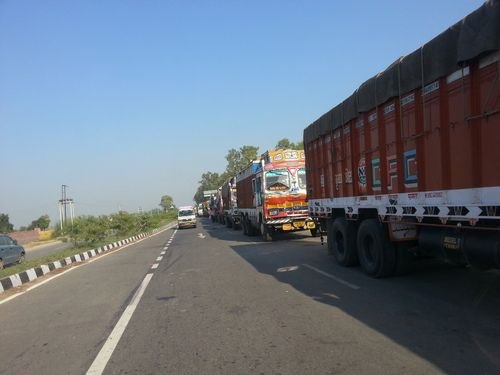- Restrictions on cross-border movement and supply-chain disruptions in several sectors continue to obstruct smooth freight movement.
- The evolving situation also had a bearing on rail and seaways freight traffic with volumes for both contracting by 21.3 per cent and 19.7 per cent YoY, respectively, during Q1 FY2021.
ICRA has revised the outlook on the Logistics sector from ‘Stable’ to ‘Negative’ given the prevailing circumstances and its near impact on the industry metrics. The rapid rise of COVID-19 pandemic and subsequent restrictive measures implemented by the Central and state governments to contain the disease has adversely impacted the prospects of the Indian logistics sector, especially the road freight transportation movement. The implementation of the 40-day nationwide lockdown aggravated the prevailing softness in the Indian economic activity, resulting in a decline in freight availability during Q4 FY2020, which further contracted sharply in Q1 FY2020.
According to Shamsher Dewan, Vice President, ICRA Ratings, “The implementation of nationwide lockdown to contain the COVID-19 spread resulted in disruption in supply-chains across sectors, restrictions on cross-border movement and dearth of availability of drivers and thereby led to contraction in revenue of the logistics sector in Q4 FY2020; and subsequently in Q1 FY2021. Further, the near-term growth prospects of the sector also remain subdued owing to the evolving COVID-19 situation, which has exacerbated the Indian macroeconomic growth scenario. Accordingly, the domestic logistics sector is expected to contract sharply in the current fiscal.”
ICRA notes that the freight movement during the period was impacted by restrictions in cross-border movement, shortage in availability of drivers and manpower due to large-scale migration and lack of availability of return load. This was also visible in the E-way bill generation data, which contracted by 52.7 per cent YoY in Q1 FY2021 but has been improving sequentially. In addition to the impact on the road logistics sector, the macro-economic slowdown and evolving COVID-19 situation also had a bearing on rail and seaways freight traffic with rail and seaways freight volumes contracting by 21.3 per cent and 19.7 per cent YoY, respectively, during Q1 FY2021.The decline in the freight volumes for the entire modal mix was more pronounced in the month of April 2020, owing to complete lockdown measures in place for the entire month. However, with gradual easing of lockdown limitations, E-way bill generation has revived to around 70 per cent, while railways and seaways freight volumes have revived to 85-90 per cent of pre-COVID levels in June 2020.
The financial performance of ICRA’s sample of ten large logistics was also adversely impacted in Q4 FY2020 as aggregate revenues of players declined by 5.3 per cent YoY, in line with the continued moderation in GDP growth, which hit an 11-year low of 3.1 per cent, resulting in subdued freight availability. The moderation is expected to continue in Q1 FY2021 with a greater degree of subdued performance, given that the ratings agency expects GDP to contract by 25 per cent during the period. Consumer demand continues to remain weak especially in segments like automotive, capital goods, and retail coupled with the slowdown in the production of bulk industrial commodities which would likely impact the growth of the sector.
With intermittent lockdowns still in place in several pockets across nation and muted recovery anticipated in the industrial activity, the logistic sector including warehousing sector is likely to witness sharp demand contraction in the near-term. Consequently, in FY2021, ICRA expects a contraction of 18-20 per cent YoY in aggregate revenues of its sample of logistics companies. Additionally, the near-term profitability metrics are anticipated to remain under pressure given the subdued fleet utilisation levels in light of muted freight availability, and continued high fixed costs such as driver salaries, truck EMIs and maintenance costs. Accordingly, the outlook on the sector has been revised to ‘Negative’ from ‘Stable’.
“While RBI’s forbearance initiative and toll exemptions (for a brief period) provide some relief but limited fleet utilisation in view of subdued freight availability and rising diesel prices are likely to have an overwhelming impact on cash flows of fleet owners in the near-term. Accordingly, credit metrics of logistics companies are expected to moderate over the near term. However, deferment of near-term debt funded capex and investment plans by major logistics players would help cushion the impact to some extent. Overall, ICRA expects the Debt/OPBITDA of its sample of logistics companies, to weaken to ~4.1x and interest coverage to moderate to 2.6x over the medium-term, as compared to 2.5x and 4.9x respectively in FY2020,” Dewan added.




















